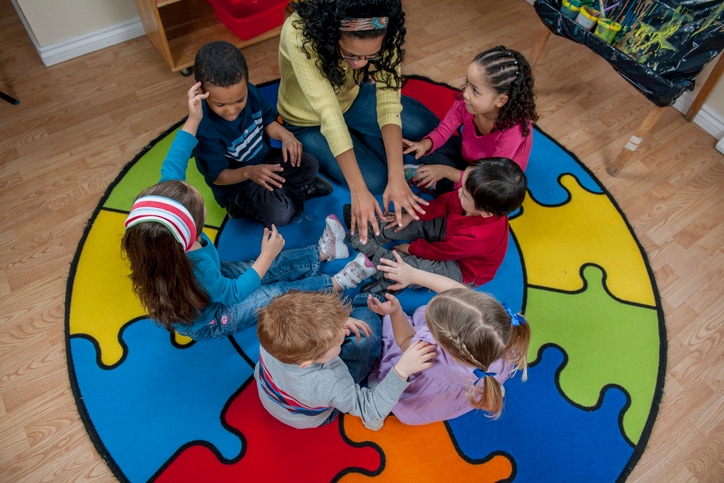More than 14 million kids under age 6 have parents in the workforce, meaning they require some kind of child care. Yet, despite this huge number, it’s still common for parents to feel guilt about sending their children to daycare. Moms and dads worry about everything from finding the right daycare to how their kids will behave once they get there.
Luckily, research shows that parents have very little reason to fret about how their kids will fare in daycare. In fact, for many kids, attending high quality daycare programs actually provides a ton of benefits. Here, we’ll explore the proven advantages kids and their families get from attending a quality daycare.
Is daycare good for kids?
Daycare has proven benefits for kids on a developmental, social and emotional level. Past research has found that kids as young as 5 years old who attend daycare demonstrate the ability to be more patient and adjust their communication style to meet the needs of different aged playmates. Daycare also has major benefits for parents, allowing for career growth and helping to level the playing field by allowing more women to enter, remain and excel in the workforce.
Here are some of the specifc ways kids and their entire families benefit from high-quality daycare.
1. Daycare kids are well-behaved
When you’re sending toddlers and preschoolers off to daycare, you might wonder if they’ll pick up bad behaviors, like hitting or biting, from the stress of adjusting their routine or even from some of the other kids. The latest research shows this isn’t the case.
A 2022 analysis of data from five different countries found that there’s actually no association between daycare attendance and behavior problems. In fact, one earlier French study actually found that kids ages 3 and up who attend a daycare center exhibit fewer behavioral issues and gain positive skills, like learning how to make friends and developing better social skills.
When care is “consistent, developmentally appropriate, and emotionally supportive, and the environment is healthy and safe,” there is a positive effect on kids’ cognitive development.
— Pediatrics study, August 2017
2. Daycare helps with cognitive development
Young kids are learning constantly, and there’s evidence that the structured nature of daycare and the educational exposure they get each day they attend can aid in their healthy development.
According to a 2017 study published in the journal Pediatrics, when care is “consistent, developmentally appropriate, and emotionally supportive, and the environment is healthy and safe,” there is a positive effect on kids’ cognitive development. Skills they learn in daycare can help with important childhood tasks like:
- Regulating emotions.
- Solving problems.
- Expressing feelings.
3. Daycare contributes to academic readiness
Several past studies have shown the positive impact structured daycare and preschool programs can have on learning and school readiness.
One study shows that by age 5, children who attend formal childcare programs demonstrate stronger reading and math skills than their peers. A separate study of kids in Oklahoma suggests these benefits can persist even into middle school.
The positive academic effects of daycare attendance may even go further than that. One study by the National Institute of Child Health and Human Development (NICHD) finds that attending a high quality child care is correlated with higher academic grades and admission to more selective colleges.
Read more:
4. Kids can get health benefits from going to daycare
Child care isn’t directly designed to improve kids’ physical health, but a growing body of research suggests that it’s having a positive impact. Kids who attend daycare before the age of 18 months have a lower risk of asthma by age 7, according to a 2020 report.
Attendance in early childhood education programs, specifically, has also been linked to improvements in the number of kids receiving routine immunizations. And, while kids are likely to get sick at daycare, experts say exposure to certain pathogens earlier in life can actually be beneficial. One Dutch study, for example, found that kids who attended daycare and contracted acute gastroenteritis (a common stomach bug) before age 1 were less likely to get it later on.
5. Daycare is good for parents, too
At the end of the day, parents need high quality daycare to be available so they can succeed in their careers and take care of other responsibilities. When women, especially, have access to high quality child care, it can strengthen their participation in the workforce and majorly boost their earnings potential.
A 2023 survey from First Five Years Fund finds that 93 percent of voters “believe it is important for working parents of young children to be able to find and afford quality child care programs.” Additionally, a 2024 report by the Center for American Progress shows that expanding access to affordable, high quality child care could increase the number of women with young children who are able to work full-time.
Over the course of a lifetime, access to affordable care could increase the lifetime earnings for women with two kids by about $94,000, according to the National Women’s Law Center. Those with less education and lower incomes, particularly if they are Black or Latino, would see the biggest percentage increases in income.Past research by the Harvard Business School has also shown that girls raised in households with working moms are more likely to hold supervisory positions later in life and earn higher wages, and boys raised in these households tend to contribute more to caregiving and household duties as adults.
Daycare is a major factor in many parents’ — especially women’s careers — and the data suggests that finding the right daycare for your child can have a positive impact on the whole family.





